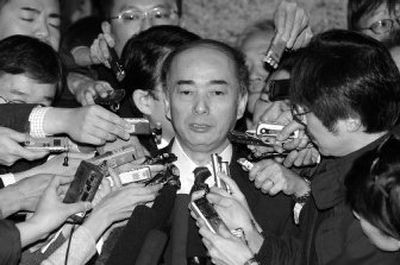N. Korea nuclear talks resume today

BEIJING – North Korea expressed its readiness today to discuss initial steps of its nuclear disarmament, raising hopes for the first tangible progress at international talks on Pyongyang’s atomic weapons program since they began more than three years ago.
“We are prepared to discuss first-stage measures,” the North’s nuclear envoy Kim Kye Gwan said on arriving in Beijing for the six-nation negotiations set to start today.
Media reports have suggested the North may agree to freeze its main nuclear reactor and allow international inspectors in exchange for energy aid as a starting step to disarm.
But Kim said any moves by North Korea would be determined by the United States’ attitude.
“We are going to make a judgment based on whether the United States will give up its hostile policy and come out toward peaceful coexistence,” he said, adding that Washington was “well aware” of what it had to do.
The North has twice boycotted the talks for more than a year, claiming various U.S. policies show Washington’s thinly veiled desire to topple the Pyongyang regime.
“I’m not either optimistic or pessimistic because there are still many points of confrontation to resolve,” Kim said.
Earlier today, the main U.S. envoy said he sensed “there is a real desire to have progress” by the North Koreans at the talks.
The lack of any on-the-ground results on disarming the North at the negotiations has raised the issue of the credibility of the talks. Since 2003, they have produced only a single agreement in September 2005 on principles for the North to abandon its nuclear program in exchange for aid and pledges that Washington won’t seek the regime’s ouster.
Ahead of this week’s round, the North had signaled it was satisfied with changes in the United States’ attitude amid an apparent greater willingness on all sides to compromise on issues that deadlocked previous talks.
However, U.S. envoy Christopher Hill denied a report in a Japanese newspaper today that the United States and North Korea had signed a memorandum during bilateral talks last month agreeing that Pyongyang’s first steps toward denuclearization and U.S. energy support would begin simultaneously.
“We did not sign anything,” Hill told reporters, but added he was hopeful the Beijing talks would lead to progress such as working groups to discuss technical issues.
Japanese envoy Kenichiro Sasae said the main goal of the current round of talks was to make concrete progress toward disarmament.
“We are prepared to do our utmost toward this goal, and we strongly hope and are certain that North Korea has come prepared to do that,” Sasae said in Beijing.
The latest nuclear standoff with the North was sparked in late 2002 after Washington accused Pyongyang of a secret uranium enrichment program in violation of a 1994 deal between the two countries. North Korea kicked out nuclear inspectors and restarted its main reactor, moves that culminated in the country’s first-ever test atomic detonation in October 2006.
Although the U.S. and other key North Korean allies China and Russia backed U.N. sanctions in the wake of the nuclear test, Washington has since engaged in a series of diplomatic overtures that have drawn praise from Pyongyang.
That includes Hill’s trip to Germany last month to meet Kim. The North said afterward the two sides had reached an unspecified agreement.